In Memoriam
This page is dedicated to leaders in the field of bioethics and humanities who have passed away. If you receive word of the death of a luminary in our field, please prepare a brief statement and a photo if possible and send this information to This email address is being protected from spambots. You need JavaScript enabled to view it..
Stephanie Solomon Cargill, PhD MPH
It is with deep sadness that we write to share the news of the passing of Stephanie Solomon Cargill, PhD, MPH. Stephanie recently joined the Alden March Bioethics Institute as Associate Professor after spending 14 years in the Department of Health Care Ethics at Saint Louis University. Stephanie had been diagnosed with stage IV non-small cell lung cancer in the Fall of 2024 and she passed away peacefully with her family on May 9.
Stephanie's life and career had a tremendous impact on her students, colleagues and the field of research ethics. During her time at Saint Louis University, she made vast contributions, both seen and unseen, including teaching and guiding health professionals, serving on and chairing multiple IRBs, and teaching and mentoring graduate students. Her scholarship on the ways in which stakeholder and community perspectives can and should shape research practice and policy will have an impact on the field for generations. In 2024, Stephanie joined the faculty of the Alden March Bioethics Institute (AMBI) at Albany Medical College as an associate professor and associate Director of Graduate Studies in Bioethics. She quickly made a mark at AMBI by joining the IRB and undertaking revisions of the graduate curriculum in bioethics. With great enthusiasm, Stephanie expanded the course offerings in research ethics and worked on redesigning the requirements for the doctoral thesis projects. During her short time at AMBI, Stephanie became an integral part of the department.
She will be remembered for her academic rigor, generosity, kindness and humor. Her former students shared the following words to describe Stephanie and her impact: "an incredible professor and amazing person", "encouraging, inspiring and kindhearted", "an extraordinary mentor...wise and kind", "she helped me to be a better thinker, and modeled a disposition towards herself and others that is worthy of respect and emulation" and "her legacy will live on in so many ways".
We are all heartbroken by the loss. Stephanie and her husband Keith have two beloved daughters Elenore (10) and Margot (7).
If you would like to donate to a charity in memory of Stephanie, we would recommend ALK Positive, an organization dedicated to supporting patients and families with her same cancer diagnosis.
Kathryn L. Moseley MD, MPH
1953-2023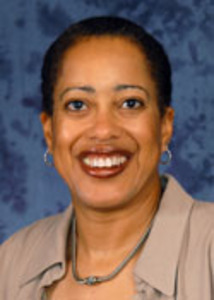
Dr. Kathryn Moseley – pediatrician, ethicist, and scholar – passed away in June 2023. She dedicated her career to improving the lives of children through her combined interests in bioethics, neonatology, primary care pediatrics, health disparities, and health services research.
Dr. Moseley graduated cum laude from Harvard and attended University of Michigan for medical school. She trained in pediatrics and neonatology in Detroit and was a fellow in clinical ethics at the University of Chicago in 1992-93. After graduating, she led an active ethics consultation service, instructed attending staff, residents, medical students, and allied health professionals in bioethics while also maintaining a busy primary care pediatric practice. She was the Director of Bioethics for the Henry Ford Health System in Detroit, and in 2002 returned to her alma mater to Chair the University of Michigan Pediatric Committee, offer clinical ethics consultation, and conduct research on the racial differences in health care decision-making and their intersection with culture and trust. Her research also made critical contributions to understanding decision making for parents on supine sleep and in the development and testing of culturally appropriate methods to increase the safety of Black and African American infants.
Dr. Moseley was synonymous with pediatric ethics. She made significant contributions in her national roles on the Bioethics Committee of the American Academy of Pediatrics, a member of the editorial board of the American Journal of Bioethics, the American Medical Associations Council on Ethical & Judicial Affairs, and as Secretary for the American Society for Bioethics & Humanities.
Dr. Moseley tirelessly fought on behalf of the youngest and most marginalized of patients, and both she and her professional contributions will be deeply missed.
Robert M. Veatch, PhD
1939-2020
Robert M. Veatch, PhD, Senior Research Scholar at the Kennedy Institute of Ethics, Professor Emeritus of Medical Ethics, and a Professor Emeritus of Philosophy at Georgetown University died Monday, November 9, 2020 at age 81 after a short illness.
Bob Veatch was a founding figure in the field of bioethics. He spent the majority of his long career at Georgetown University’s Joseph P. and Rose F. Kennedy Institute of Ethics (KIE) spending 40+ years there and serving as a former Director of the Institute from 1989-1996. He began the Kennedy Institute of Ethics Journal (1991) and served as Senior Editor until 2011. He also cofounded and edited the Ethics and Intellectual Disability Newsletter. Before coming to Georgetown, he began his career at the Hastings Center in 1970.
Bob held an MA and PhD in Religion and Society from Harvard University, with a focus on medical ethics that he proposed. His professors included Arthur Dyck, Ralph Potter, Renee Fox, Talcott Parsons, and John Rawls (Dyck and Potter were his dissertation mentors). He also held a BD (magna cum laude) from Harvard Divinity School. In a 2014 interview, he said that study with Rawls, “surely oriented [him] to the academic study of questions of justice.” In addition, Dr. Veatch, son of a pharmacist, held a MS in Pharmacology from the University of California Medical Center, San Francisco and a BS in Pharmacy (summa cum laude) from Purdue University.
View the In Memoriam Article
Albert R. Jonsen, PhD 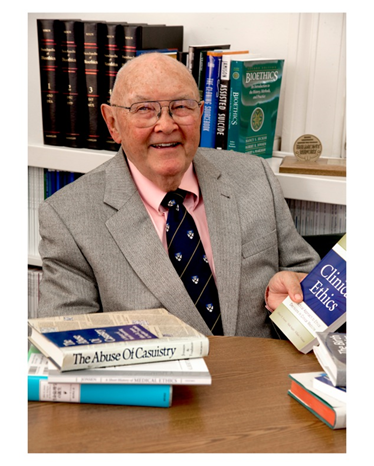
1931-2020
Albert Jonsen, one of the founders of the field of Bioethics, died on 21st October at his home in San Francisco. At the time of his death, he was working on the completion of the 9th edition of his seminal book, 'Clinical Ethics: A Practical Approach to Ethical Decisions in Clinical Medicine', co-authored with colleagues, Mark Siegler and William Winslade. Jonsen's work was noted for bringing together theory and practice. He was devoted to resolving ethical issues in daily clinical practice. Casuistry was the methodology of ethical analysis he adopted and was most well-known for. He served on multiple major national commissions that led to the development of guidelines around clinical and research ethics. Other leadership positions included his role as Commissioner on the National Commission for the Protection of Human Subjects of Biomedical and Behavioral Research (1974 - 1978) that led to the writing of the Belmont Report, the statement of ethical principles guiding research ethics. He also served on The President's Commission for the Study of Ethical Problems in Medicine (1979 - 1982), which produced the influential definition of death that became the foundation of a model legislation in the United States. Jonsen was the President of the University of San Francisco where he taught Philosophy and Theology and in 1972, he joined the University of California, San Francisco as the Chief of the Division of Medical Ethics. In 1987, he took on the position of Chairman of the Department of Medical History and Ethics at the University of Washington where he remained until his retirement in 1999. He returned to his native San Francisco and in 2003, co-founded with Dr. William Andereck, Sutter Health's Program in Medicine and Human Values at California Pacific Medical Center. At Sutter Health's Bioethics Program, he continued his scholarly work by conducting multiple research studies, and authoring a number of important books and papers. Teaching was always a high priority, and during this time he also mentored Bioethicists and Clinical Ethics Fellows. The emphasis was on applying his case analysis method to actual patient care situations and advising healthcare providers about the ethically appropriate course of action.
In addition to being a prolific thinker and writer, Jonsen was well-known as a captivating speaker. His teachings and writings created multiple generations of bioethics leaders and his work continues to influence students throughout the world. He will live on through his work.
Renee Fox, PhD
1928-2020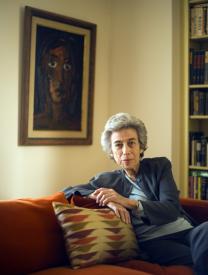
Renée, as those who know her well can attest, was an incomparable intellect and life force -- truly sui generis. She joined the Sociology Department at Penn in 1969, after earning her PhD from Radcliffe College at Harvard and teaching at Barnard College for twelve years. Already a distinguished interdisciplinary scholar, Renée was also appointed to the Departments of Medicine and Psychiatry. Her entrance at the level of full professor was significant and put her in the company of a very small cadre of female professors across the university.
Renée loved field work. In the 1950s, she began a career that established and shaped, over a span of more than 50 years, the field of medical sociology. Her classic works -- and there are many -- such as the anatomy course autopsy and attitude formation of medical students, or training for uncertainty, or Experiment Perilous, The Courage to Fail (researched and written with Judith Swazey), Spare Parts (ditto), or Doctors Without Borders -- are all still touchstones of incisive and illuminating scholarship, often as relevant today as they were when first written.Renée also loved teaching. We both benefited from Renée‘s pedagogical gifts, as did countless others, from undergraduates to graduate students, from medical and nursing students to just about every other type of student one can imagine. Renée was always a critical thinker and reader, pushing for those under her tutelage to be clearer and conceptually deeper -- and also a cheerleader, urging us onward and celebrating every accomplishment. Renée also loved her family and friends. She took great joy in others.
Regarding bioethics, Renée was both a founder and persistent critic of the field. She did not consider herself a bioethicist, but her keen moral insights about the medical enterprise and her penchant for vigorous ethical argument tell a different story. Being both an insider and outsider enabled her to shed light on the innards of our field, questioning research methods and priorities, and always challenging bioethics scholars to return to the basics of compassion and seeking justice in an unjust world. She will be dearly missed. Photo credit
David J. Rothman, PhD
1937-2020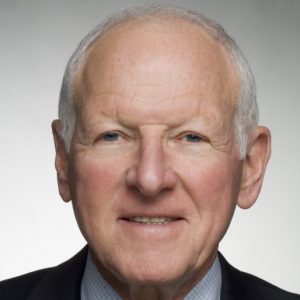
The intellectuals who transformed bioethics from a protest movement into a professional field did not conceive of themselves as founding a new field. They thought of themselves as working in loosely formed collaborations to critique, reform, and improve American healthcare at a moment when "Practically every development in medicine in the post-World War II period distanced the physician and the hospital from the patient and the community, disrupting personal connections and severing bonds of trust. Whatever the index—whether ties of friendship, religion, ethnicity, or intellectual activity—the results highlight a sharp division between the lay world and the medical world." These words were written by David Rothman, Professor of Social Medicine at Columbia University's College of Physicians and Surgeons and one of the most widely read historians of medicine of the last century. His pioneering histories of the asylum (1971, 1984), his collaborative 1978 book, Doing Good, written with, among others, Willard Gaylin, co-founder of the Hastings Center; and the book he wrote with his wife, Sheila Rothman,about the Willowbrook experiments on children with disabilities (1984), were required reading in the early years of bioethics. So too was his 1991 exploration of the factors that led to the creation of bioethics, Strangers At the Bedside: A History of How Law and Bioethics Transformed Medical Decision-making. As should be evident from the passage taken from this book quoted above, the "strangers" at the bedside were not bioethicists, they were physicians; and, as Rothman perceptively realized, the clinical branch of bioethics was created to fill the ever-widening gap between physicians and hospitalized patients and their families.
View the In Memoriam Article
Ann Baile Hamric, PhD RN
1947-2020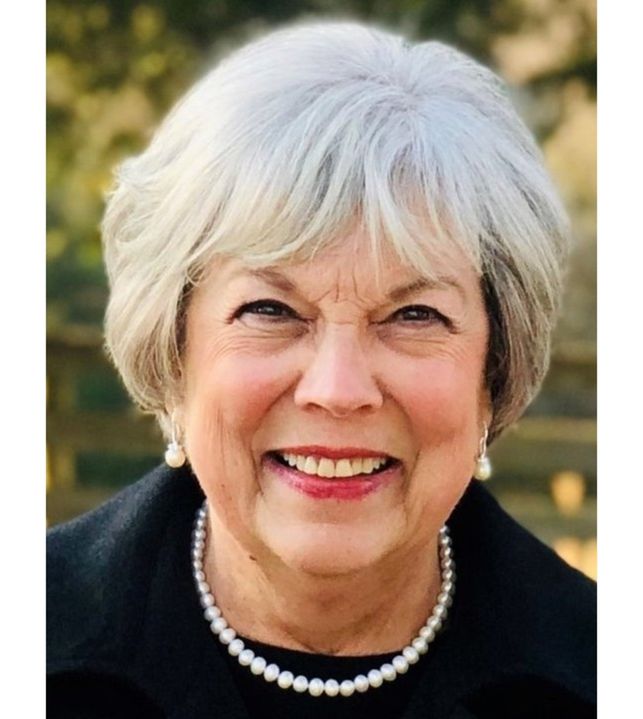
Dr. Ann Baile Hamric lived a deliberately full, vibrant, and joyful life. Her singular contributions to her profession, her community, and her family touched the lives of the many people she encountered. Ann’s leadership ability emerged early in her career. In the summer of 1970, following her Vanderbilt graduation, Ann helped create the first Student Health Coalition Appalachian health fairs in rural Tennessee where she devised means of conducting both home visits and follow-up visits to isolated locations, an experience that inspired her to continue her education. As a young practicing nurse, Ann’s work with a severely injured paraplegic only a few years younger than herself made a deep impression on her that ignited a lifelong interest in the ethics of care, an area in which she became a thought leader. Her extensive research on moral distress in healthcare professionals broke new ground in biomedical ethics, including her creation of an instrument to allow careful measurement of this important phenomenon. Ann’s 37 publications stemming from her research continue to be widely cited.For four years, Ann served as an Associate Professor at the Louisiana State University Nursing School where she testified before the Louisiana Legislature advocating increased medical privileges for advanced practice nurses. She became the senior editor of the definitive textbook on advanced practice nursing in 1997—now in its 6th edition—which helped to define the emerging roles of nurse practitioners, nurse midwives, nurse anesthetists, and clinical nurse specialists. During her 12 years as a Professor at the University of Virginia, Ann was elected to the Faculty Senate, served a term as its Chair, and was named to the University’s Presidential Search Committee. Widely loved and respected as a Professor, Ann was selected by UVA students to deliver a “Last Lecture.” Hers was an inspiring account of her deeply meaningful journey as a survivor of breast cancer. A Fellow of the American Academy of Nursing, Ann played a pivotal role in creating the Academy’s Bioethics Expert Panel, and served as the lead author on the Panel’s first White Paper. With a colleague, she edited an issue of The Hastings Center Report, the leading bioethics journal; hers was the first issue devoted to nursing ethics. In 2011, she received the Distinguished Nurse award. Read more.
View the In Memoriam Archive
